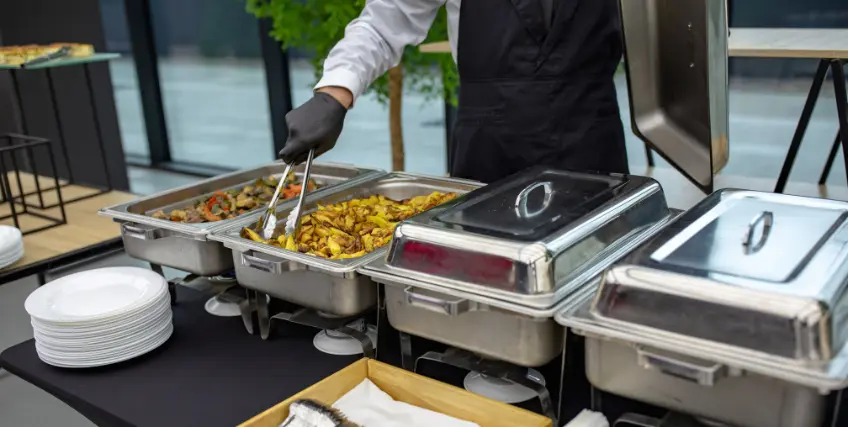Cooking Up Success How Catering Business Loans Fuel Growth
February 11, 2025 | Last Updated on: February 12, 2025

A Comprehensive Guide to Securing Financing for Your Small Business Catering Venture
Starting a catering business can be an exciting and rewarding venture, but securing the necessary financing to get it off the ground can be one of the most challenging aspects. Whether you're looking to buy equipment, hire staff, market your business, or simply cover operational expenses, understanding the different financing options available can help you make the best decision for your needs. Below, we will explore multiple methods for securing financing and key factors to consider when pursuing food catering for business.
1. Understanding the Financial Needs of Your Catering Business
Before seeking financing, it's crucial to understand exactly what your business will require in terms of capital. Food catering companies have unique financial needs due to the nature of the industry. Some of the common expenses for starting a food catering business include:
- Equipment Costs: This could include items like ovens, refrigerators, catering vehicles, serving trays, utensils, etc.
- Operating Expenses: Staff wages, ingredients, utilities, insurance, and licenses.
- Marketing: Building an online presence, creating promotional materials, or attending trade shows.
- Inventory Management: The cost of maintaining stock for various events.
- Transport: If you need a vehicle for transporting food and equipment to events.
- Rent and Overhead: If you're operating from a commercial kitchen or storefront.
Creating a detailed financial forecast or budget that outlines these costs can help determine how much capital you will need to secure and which financing options will work best for your small business catering.
2. Traditional Loans for Starting a Catering Business
One of the most common ways to finance a small business catering venture is through a traditional business loan. This option typically involves borrowing a lump sum from a bank or financial institution and repaying it over time with interest. However, to qualify for a traditional business loan, you’ll generally need to meet certain requirements.
What to Expect with Traditional Business Loans
- Eligibility: Lenders will typically require a solid business plan, a good credit score (usually 680 or higher), and a record of profitability or a strong financial forecast.
- Loan Amounts and Terms: Loan amounts for small businesses can range from a few thousand dollars to hundreds of thousands, depending on your needs. The terms vary but often range from three to seven years, with fixed or variable interest rates.
- Collateral: Many traditional loans require collateral, such as business assets or personal guarantees, to secure the loan.
Pros:
- Low interest rates, particularly with government-backed loans.
- Long repayment terms, which can ease cash flow pressure.
- Well-established loan programs, making this a reliable option for many entrepreneurs.
Cons:
- Strict eligibility requirements, including good credit and strong financial history.
- May take longer to process compared to alternative funding sources.
- Risk of losing collateral if you are unable to repay the loan.
SBA Loans
The Small Business Administration (SBA) offers a range of loan programs aimed at helping small businesses. The most popular is the SBA 7(a) loan, which provides funding for working capital, purchasing equipment, or expanding operations. SBA loans generally have lower interest rates and longer repayment terms, but they can be challenging to qualify for.
3. Microloans and Community Lenders
If you’re unable to secure a large loan from a traditional bank, you might consider microloans or loans from community development financial institutions (CDFIs). These loans tend to be for smaller amounts, typically under $50,000, and are often more accessible to new businesses or those with lower credit scores.
What to Expect with Microloans
- Eligibility: These loans are designed for small businesses, startups, and low-income entrepreneurs, so the qualification process is often more lenient than traditional loans.
- Loan Amounts: Microloans generally offer smaller amounts (anywhere from $500 to $50,000).
- Repayment Terms: These loans usually have shorter repayment terms (one to five years), but interest rates can still be competitive.
Pros:
- Easier to qualify for compared to traditional loans.
- Great for new businesses or businesses in underserved areas.
- Flexible use of funds, including working capital and equipment purchases.
Cons:
- Smaller loan amounts, which may not be sufficient for more extensive startup costs.
- Higher interest rates than traditional bank loans.
- Shorter repayment terms, which can be challenging if cash flow is inconsistent.
4. Grants for Small Business Catering
While grants are often competitive and difficult to secure, they can be an excellent option for financing, especially for businesses with a unique focus like small business catering. Grants provide funding that doesn’t require repayment, though they often come with strict reporting requirements.
Types of Grants
- Government Grants: These can be offered through federal, state, or local programs. Websites like Grants.gov or your local Small Business Development Center (SBDC) are good places to start looking.
- Private Grants: Some private organizations and corporations offer grants to small businesses, particularly those that focus on community development or innovation in specific industries.
- Industry-Specific Grants: Some grants are designed specifically for the food industry, including food catering for businesses that focus on sustainability, local sourcing, or public health.
Pros:
- Provides funding that doesn’t require repayment.
- It helps to fund specific projects, such as purchasing equipment or expanding your menu.
Cons:
- Highly competitive with many applicants.
- Often requires detailed application and reporting of how the money is used.
- Limited to certain business types or projects, which may not align with your needs.
5. Crowdfunding and Peer-to-Peer Lending
Crowdfunding and peer-to-peer (P2P) lending have become popular financing options for small businesses in recent years. Crowdfunding allows you to raise money from the public through platforms like Kickstarter, GoFundMe, or Indiegogo. P2P lending, on the other hand, connects businesses with individual investors who are willing to lend money for a return.
Crowdfunding
With crowdfunding, you typically offer rewards (like discounted food catering services or branded merchandise) in exchange for contributions from your supporters. This method works well if you have a compelling story, a strong social media following, or an innovative concept.
P2P Lending
P2P lending platforms like LendingClub or Prosper allow small business catering owners to borrow money directly from individual investors. These loans can sometimes have more flexible terms than traditional bank loans, though they may come with higher interest rates for small business catering ventures.
Pros:
- Can be a great option for businesses with a loyal following or a strong brand story.
- No need to give up equity or collateral in most cases.
- Fast funding.
Cons:
- Crowdfunding requires a compelling marketing strategy to attract backers.
- Interest rates for P2P loans may be higher than traditional loans.
- It can take time to reach your fundraising goals, and there’s no guarantee your small business catering will succeed.
6. Business Line of Credit
A business line of credit provides flexible access to funds, allowing you to borrow money as needed up to a certain credit limit. This option can be ideal for business food catering with fluctuating expenses, such as seasonal demand or unexpected last-minute orders.
What to Expect
- Eligibility: Banks and alternative lenders often require a solid credit score (typically 600 or above) to qualify. They may also look at your business's revenue and financial health.
- Credit Limit: You are given a specific credit limit, and you only pay interest on the amount you borrow. This gives you flexibility in how you use the funds.
- Repayment: Like a credit card, you can make monthly payments, but the balance can carry over as long as you're within the credit limit.
Pros:
- Flexible and fast access to funds.
- Ideal for covering operational expenses, such as paying employees or buying ingredients.
- Interest is only paid in the amount borrowed.
Cons:
- High-interest rates compared to traditional loans.
- If you're not careful, debt can accumulate quickly.
- Requires good credit and financial stability to qualify.
7. Angel Investors and Venture Capital
For larger-scale catering businesses with potential for significant growth, angel investors or venture capital (VC) firms could be an option. These investors provide funding in exchange for equity in the business.
Angel Investors
Angel investors are individuals who invest their personal money in startups or small businesses in exchange for equity. They may also offer valuable business advice and mentorship.
Venture Capital
Venture capital firms typically invest in businesses that have high growth potential and are looking to scale quickly. In exchange for funding, VCs usually take a more active role in the business and expect a return on investment (ROI) within a few years.
Pros:
- Can provide substantial funding for growth and expansion.
- Investors often bring valuable industry expertise and connections.
- Ideal for businesses looking to scale quickly.
Cons:
- Giving up equity means losing some control over your business.
- Investors expect a significant ROI, which can put pressure on the business.
- Often suitable only for businesses with high growth potential.
Final Thoughts on Choosing the Right Financing Option for Your Catering Business
When it comes to starting small business catering, each financing option comes with its pros and cons, and the best choice for your business depends on your specific needs, goals, and financial situation. To summarize:
- Traditional loans and SBA loans are great for established businesses with a good credit history.
- Microloans and community lenders offer more flexibility and are ideal for newer businesses or those with limited credit history.
- Grants provide funding that doesn’t require repayment but are highly competitive.
- Crowdfunding and P2P lending allow for fast access to funds but require strong marketing skills and a solid support base.
- Business lines of credit provide flexible access to funds but often come with higher interest rates.
- Angel investors and VC funding are best for small business catering with high growth potential but require giving up equity and control.
By carefully assessing your business needs and considering these options, you can secure the necessary financing to launch and grow your catering business. Ultimately, a well-structured business plan, solid financial projections, and a clear understanding of your funding options will give you the best chance of success in securing financing for your small business catering.
FAQs about Small Business Catering
Do business grants need to be repaid?
No, grants don’t need to be repaid, though they often come with strict reporting requirements.
What are the cons for grants for small business catering?
The cons for grants for small business catering include being highly competitive with many applicants, requires detailed application and reporting of how the money is used, and limited to certain business types or projects, which may not align with all business needs.
What requirements are needed for a traditional business loan for starting a catering business?
Lenders will typically require a solid business plan, a good credit score, and a record of profitability or a strong financial forecast.
What is P2P lending for food catering companies?
P2P lending platforms allow small business catering owners to borrow money directly from individual investors. These loans can sometimes have more flexible terms than traditional bank loans, though they tend to require higher interest rates.
What are angel investors?
Angel investors are individuals who invest their personal money in startups or small businesses in exchange for equity. They may also offer valuable business advice and mentorship.




